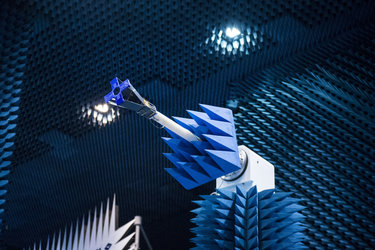Accept all cookies Accept only essential cookies See our Cookie Notice

About ESA
The European Space Agency (ESA) is Europe’s gateway to space. Its mission is to shape the development of Europe’s space capability and ensure that investment in space continues to deliver benefits to the citizens of Europe and the world.
Highlights
ESA - United space in Europe
This is ESA ESA facts Member States & Cooperating States Funding Director General Top management For Member State Delegations European vision European Space Policy ESA & EU Space Councils Responsibility & Sustainability Annual Report Calendar of meetings Corporate newsEstablishments & sites
ESA Headquarters ESA ESTEC ESA ESOC ESA ESRIN ESA EAC ESA ESAC Europe's Spaceport ESA ESEC ESA ECSAT Brussels Office Washington OfficeWorking with ESA
Business with ESA ESA Commercialisation Gateway Law at ESA Careers Cyber resilience at ESA IT at ESA Newsroom Partnerships Merchandising Licence Education Open Space Innovation Platform Integrity and Reporting Administrative Tribunal Health and SafetyMore about ESA
History ESA Historical Archives Exhibitions Publications Art & Culture ESA Merchandise Kids Diversity ESA Brand Centre ESA ChampionsLatest
Space in Member States
Find out more about space activities in our 23 Member States, and understand how ESA works together with their national agencies, institutions and organisations.
Science & Exploration
Exploring our Solar System and unlocking the secrets of the Universe
Go to topicAstronauts
Missions
Juice Euclid Webb Solar Orbiter BepiColombo Gaia ExoMars Cheops Exoplanet missions More missionsActivities
International Space Station Orion service module Gateway Concordia Caves & Pangaea BenefitsLatest
Space Safety
Protecting life and infrastructure on Earth and in orbit
Go to topicAsteroids
Asteroids and Planetary Defence Asteroid danger explained Flyeye telescope: asteroid detection Hera mission: asteroid deflection Near-Earth Object Coordination CentreSpace junk
About space debris Space debris by the numbers Space Environment Report In space refuelling, refurbishing and removingSafety from space
Clean Space ecodesign Zero Debris Technologies Space for Earth Supporting Sustainable DevelopmentApplications
Using space to benefit citizens and meet future challenges on Earth
Go to topicObserving the Earth
Observing the Earth Future EO Copernicus Meteorology Space for our climate Satellite missionsCommercialisation
ESA Commercialisation Gateway Open Space Innovation Platform Business Incubation ESA Space SolutionsEnabling & Support
Making space accessible and developing the technologies for the future
Go to topicBuilding missions
Space Engineering and Technology Test centre Laboratories Concurrent Design Facility Preparing for the future Shaping the Future Discovery and Preparation Advanced Concepts TeamSpace transportation
Space Transportation Ariane Vega Space Rider Future space transportation Boost! Europe's Spaceport Launches from Europe's Spaceport from 2012Latest

Aircraft nose job assessed in Hertz chamber
Thank you for liking
You have already liked this page, you can only like it once!
ESA test facilities can test more than just space hardware: here, the 2.0m-diameter nose of an Airbus A340 aircraft is seen in ESA’s Hertz chamber, undergoing radio-frequency testing.
“We had a rare gap in our test schedule and were able to accommodate a commercial customer,” explains ESA antenna engineer Eric Van Der Houwen.
“SPECTO Aerospace works on repairing damaged structural aircraft parts like radomes – radar domes – found on the noses of aircraft, which protect forward-looking weather radar and other equipment. But before any repaired radome can be returned to flight it needs radio frequency testing to confirm the repair has been a success and the structure is performing acceptably.”
A radome can be damaged in various ways, including lightning strikes, bird strikes or due to hail erosion. The repair process needs to return the radome – an aramid fibre honeycomb composite sandwich structure – to be high mechanically stiff and aerodynamically smooth – while also ensuring its desired radio-frequency (RF) performance remains intact.
“Sometimes a repaired radome can look good but might not perform so well in RF terms,” adds Eric. “It might be that the radome structure is absorbing too much RF energy, or triggering signal reflections or interactions that alter the shape of what should be a forward-looking signal. In this particular case, this radome requires a ‘side lobe level test’ – checking its sideways emissions.
“So we first of all measure the antenna pattern and energy level without the radome and then with the radome to see how much these values change. Finally we again test the antenna without the radome, to make sure our results match on a reliable basis.”
Part of ESA’s technical heart in the Netherlands, the metal-walled ‘Hybrid European Radio Frequency and Antenna Test Zone’ chamber is shut off from all external influences. Its internal walls are studded with radio-absorbing ‘anechoic’ foam pyramids, allowing radio-frequency testing without any distorting reflections.
The Hertz chamber carried out a rapid test campaign for the company, with the nose cone – which fits onto both Airbus A330 and A340 aircraft – into and out of ESA’s ESTEC technical centre in Noordwijk, the Netherlands in a single day.
“ESA is one of our reliable partners for specific aircraft parts testing,” remarks Jeroen Mast, managing director of SPECTO. “Our in-house test facility is able to perform the standard transmission efficiency tests for aircraft radomes, with ESA’s anechoic test facilities offering a valuable add-on to our services.”
ESA’s test facilities at the service of all Agency missions and Member States are supported through ESA’s Basic Activities. At the Space19+ Council of Ministers in Seville, Spain on 27-28 November, ESA will press for an increase in Basic Activities to maintain and develop its test facilities and general infrastructure.
-
CREDIT
ESA-P. de Maagt -
LICENCE
ESA Standard Licence

Wall of Hertz test chamber

Radio eye on tree-counting Biomass

Inside Hertz Chamber

Qarman CubeSat in Hertz test chamber















 Germany
Germany
 Austria
Austria
 Belgium
Belgium
 Denmark
Denmark
 Spain
Spain
 Estonia
Estonia
 Finland
Finland
 France
France
 Greece
Greece
 Hungary
Hungary
 Ireland
Ireland
 Italy
Italy
 Luxembourg
Luxembourg
 Norway
Norway
 The Netherlands
The Netherlands
 Poland
Poland
 Portugal
Portugal
 Czechia
Czechia
 Romania
Romania
 United Kingdom
United Kingdom
 Slovenia
Slovenia
 Sweden
Sweden
 Switzerland
Switzerland
























